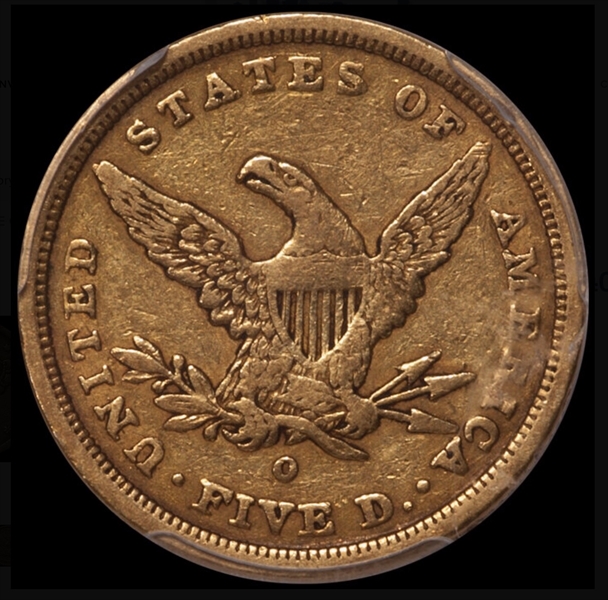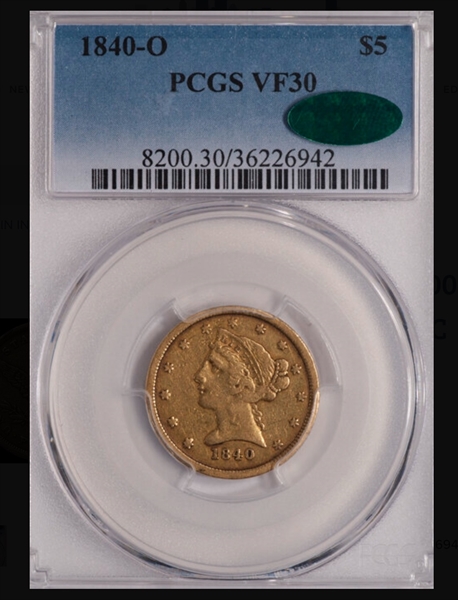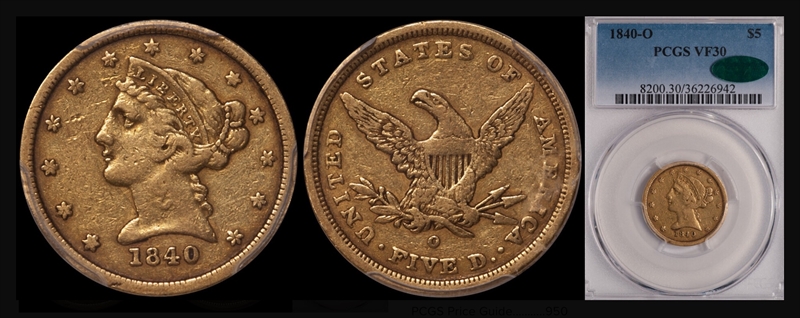1840-O $5 VF30 认证号36226942, PCGS号8200
拥有者评论
CAC
专家评论
David Akers
The 1840-O is similar in overall rarity to the much lower mintage 1840-D although due to the popularity of Dahlonega Mint coins, the 1840-O generally does not bring a comparable price in comparable condition. The typical specimen is well worn with VF and EF being the grades one normally will see. AU specimens are very rare and strictly uncirculated examples are of the highest rarity. Again, both broad mill and narrow mill varieties exist but the over-whelming majority of known specimens are of the narrow mill variety.Doug Winter
The first 1840-O half eagles were struck in January, 1840. All of these, along with small groups produced in February and March of this year, are the Broad Mill border variety and were struck with a collar measuring 22.5 millimeters as seen on all 1839 half eagles. A total of 4,620 1840-O Broad Mill half eagles were struck.The remaining 35,500 1840-O half eagles were struck with small diameter collars and they are called the Narrow Mill variety. This subtle design change occurred on all half eagles in 1840. The New Orleans half eagles were struck from one of two of these borders. One measures 21.8 millimeters while the other is 22.0 millimeters. These borders are broader than many of the subsequent ones used at the Charlotte and Dahlonega mints. It is perhaps more fitting to describe this coin as an 1840-O Medium Mill half eagle.
This popular first-year-of-issue half eagle is typically seen in VF and EF grades. It is scarce in the lower AU grades and very scarce in the higher range of this grade. There are around seven to nine Uncirculated pieces known including two or three that are choice. The Broad Mill variety is rare in all grades and it is extremely rare in AU55 and above. I have never seen one which graded Uncirculated.
STRIKE: The quality of strike seen on an 1840-O half eagle depends on which dies were used to strike the coin. On the Narrow Mill coins, the strike is generally of average quality. The obverse center is often weak with a lack of detail on the curls around the face. Examples do exist, however, that are well struck at the center. The reverse is usually better struck, although many are weak on the eagle’s neck feathers and the horizontal lines in the shield. Even well struck examples tend to have some weakness on the eagle’s right leg and claw. Broad Mill coins always seem to be weakly struck with the centers showing an almost sunken appearance.
SURFACES: This date is nearly always seen with very heavily abraded surfaces. This issue was clearly actively used in commerce and the typical example is marked and may show scratches as well. I have seen a number of 1840-O half eagles that show a number of large copper sports on the surfaces. Nearly every Broad Mill coin I have seen is well-worn with heavy marks. Many have been cleaned at one time.
LUSTER: The luster is frosty with a slightly grainy texture. There are some higher grade 1840-O Narrow Mill half eagles that show very good luster but the typical piece has a somewhat drab appearance. I have never seen a Broad Mill coin that had more than a hint of luster.
COLORATION: The coloration ranges from green-gold to reddish-gold. On a number of the higher grade pieces known, the coloration is exceptional and these coins can show superb hues which incorporate multiple shadings. Many 1840-O half eagles have been cleaned or dipped and have a washed out, unappealing appearance.
EYE APPEAL: The level of eye appeal seen on this date varies greatly. The typical 1840-O half eagle is not that well struck, is abraded and worm and has been cleaned. But there are some very pleasing higher grade pieces known; these may have been saved as first-year-of-issue souvenirs. The Broad Mill variety has very poor eye appeal and examples that are even average quality for the grade are very rare.
DIE CHARACTERISTICS: The die characteristics of 1840-O half eagles are peculiar to specific varieties. They are mentioned below at the end of each die variety’s description.
MAJOR VARIETIES: There are three varieties known:
Variety One: Broad Mill. The coin is 22.5 mm. in diameter. All have a large oval mintmark which is placed over the VE in FIVE.
This variety is scarce in all grades and becomes very rare in AU50. The finest example of which I am aware is an AU58 in the Pinnacle collection. The Eliasberg: 414 coin would also grade AU58 by today’s standards.
This variety is beginning to become better known. As it becomes a more accepted member of the New Orleans half eagle set (and not recognized solely as a variety), its level of importance is likely to grow. At this point, it remains extremely undervalued relative to its rarity.
Variety Two: Narrow Mill. The coin is 22.0 mm. in diameter. The date is slightly higher than on Variety Three with the 1 closer to the truncation. There are heavy raised die lines at the IB in LIBERTY. The reverse is the same as on Variety One. There are often faint clashmarks seen on the reverse.
This is the most common of the three varieties.
Variety Three: Narrow Mill. The coin is 21.8 mm. in diameter. The date is lower than on Variety Two with the 1 further from the truncation. The 1 shows light repunching at its base. The mintmark is small and round. It is placed over the V in FIVE. There are raised die lines between the border and the letters in STATES. Many of the vertical stripe lines extend into the horizontal shield lines above. A light clashmark connects the right wing and the lower beak.
This variety is rare in all grades.
PCGS #
8200
设计师
Christian Gobrecht
边缘
Reeded
直径
22.50 毫米
重量
8.36 克
铸币数量
40120
金属成分
90% Gold, 10% Copper
更高评级数量
118
评级较低的钱币数量
8
地区
The United States of America
价格指南
PCGS 数量报告
拍卖 - PCGS 评级的
拍卖 - NGC 评级的
稀有性和存量估计 了解更多
| 所有评级 | 237 |
| 60或以上 | 10 |
| 65或以上 | 0 |
| 所有评级 | R-6.7 |
| 60或以上 | R-9.5 |
| 65或以上 | R-10.1 |
| 所有评级 | 64 / 112 TIE |
| 60或以上 | 59 / 112 TIE |
| 65或以上 | 1 / 112 |
| 所有评级 | 99 / 218 TIE |
| 60或以上 | 87 / 218 TIE |
| 65或以上 | 1 / 218 |
状况普查 了解更多
| #1 MS64 estimated grade |
| #2 MS63 PCGS grade |
| #3 MS62 PCGS grade |
| #3 MS62 PCGS grade |
| #3 MS62 PCGS grade |























